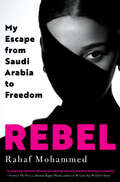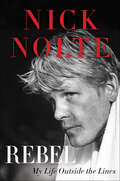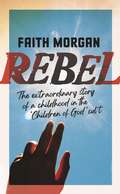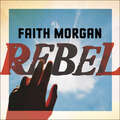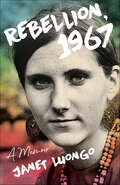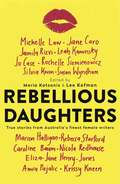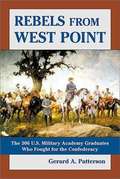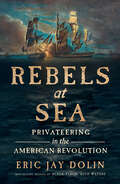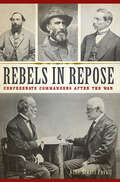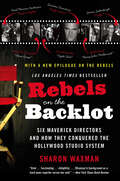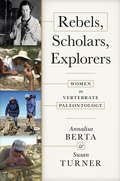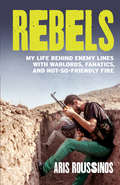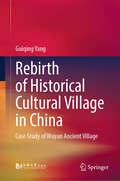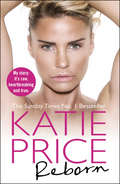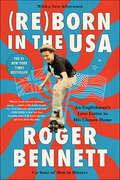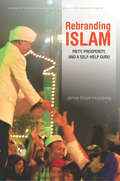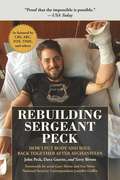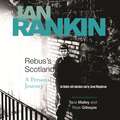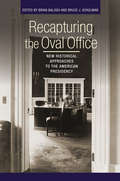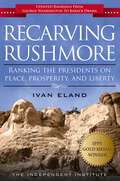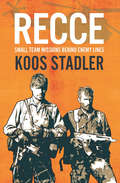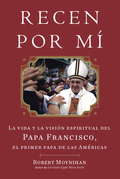- Table View
- List View
Rebel: My Escape from Saudi Arabia to Freedom
by Rahaf MohammedIn early 2019, after three years of careful planning, Rahaf Mohammed finally escaped her abusive family in Saudi Arabia—but made it only to Bangkok before being stripped of her passport. If forced to return home, she was sure she would be killed, like other rebel women in her country. As men pounded at the door of her barricaded hotel room, she created a Twitter account. The teenager reached out to the world, and the world answered—she gained 45,000 followers in one day, and those followers helped her seek asylum in the West.Now, Rahaf Mohammed tells her remarkable story in her own words, revealing untold truths about life in the closed kingdom, where young women are brought up in a repressive system that puts them under the legal control of a male guardian. Raised with immense financial privilege, but under the oppressive control of her male relatives—including her high-profile politician father—Rahaf endured an abusive childhood in which oppression and deceit were the norm. Moving from Rahaf’s early days on the underground online network of Saudi runaways who use coded entries to learn how to flee the brutalities of their homeland, to her solo escape to Canada, Rebel is a breathtaking and life-affirming memoir about one woman’s tenacious pursuit of freedom.
Rebel: My Life Outside the Lines
by Nick NolteThe legendary icon tells his story—a tale of art, passion, commitment, addiction, as intense and hypnotic as the man himself.In a career spanning five decades, Nick Nolte has endured the rites of Hollywood celebrity. Rising from obscurity to leading roles and Oscar nominations, he has been both celebrated and vilified in the media; survived marriages, divorces, and a string of romances; was named the “Sexiest Man Alive” by People magazine; and suffered public humiliation over his drug and alcohol issues, including a drug-fueled trip down a “long road of nothingness” that ended in arrest.Despite these ups and downs, Nolte has remained true to the craft he loves, portraying a diverse range of characters with his trademark physicality and indelible gravelly voice. Already 35 when his performance in the 1976 miniseries Rich Man, Poor Man launched him to stardom, Nolte never learned to play by Hollywood’s rules. A rebel who defies expectations, an obsessive method actor who will go to extremes for a role (he lived among the homeless to prepare for Down and Out in Beverly Hills), Nolte is motivated more by edgier, more personal projects than by box office success. Today he is clean yet still driven, juggling a number of upcoming works and raising his young daughter.A man who refuses to hide his mistakes, Nolte now delivers his most revealing performance yet. His revealing memoir, filled with sixteen pages of color photos, offers a candid, unvarnished close-up look at the man, the career, the loves, and the life.
Rebel: The extraordinary story of a childhood in the 'Children of God' cult
by Faith MorganMy name is Faith Morgan and I was born into the infamous Children of God cult, or 'The Family' as it came to be known. At age 19 I managed to escape and entered a world in which I had to learn how to live again. Rebel is my story.My teenage diary helps piece the story of my travels in Costa Rica, India, Greece, Mexico, and London together. Of the communes, the 'missions', the friendships and the relationships. And of course, my enduring faith: in Jesus, in the Prophet (cult leader David Berg), and in the inevitability of the coming end times, which I fully believed would arrive.But beyond the brainwashing and mistreatment is the extraordinary story of my family and the adventures of my early life which help me understand what happened and why, so it doesn't happen to others. The spirit of that defiant girl who escaped is still in there somewhere, and through telling my story I wish to look into the eyes of 'evil', with its many faces so I can send it on its way.
Rebel: The extraordinary story of a childhood in the 'Children of God' cult
by Faith Morgan'A rare, highly detailed insider account of a "family" designed to be shut off from the world. And of Morgan, a ferocious young girl who railed hard against it.' Sunday Times'This is an unflinching and courageous memoir, exposing one of the world's most infamous cults. It's an inspiring, if at times upsetting, read.' Daily ExpressMy name is Faith Morgan and I was born into the infamous Children of God cult, or 'The Family' as it came to be known. At age 19 I managed to escape and entered a world in which I had to learn how to live again. Rebel is my story.My teenage diary helps piece the story of my travels in Costa Rica, India, Greece, Mexico, and London together. Of the communes, the 'missions', the friendships and the relationships. And of course, my enduring faith: in Jesus, in the Prophet (cult leader David Berg), and in the inevitability of the coming end times, which I fully believed would arrive.But beyond the brainwashing and mistreatment is the extraordinary story of my family and the adventures of my early life which help me understand what happened and why, so it doesn't happen to others. The spirit of that defiant girl who escaped is still in there somewhere, and through telling my story I wish to look into the eyes of 'evil', with its many faces so I can send it on its way.
Rebel: The extraordinary story of a childhood in the 'Children of God' cult
by Faith MorganThe extraordinary memoir of a childhood spent in the 'Children of God' cult.Rebel tells the story of Faith, a woman who grew up in the Children of God cult (known latterly as The Family). Now in her forties with two teenage children of her own, Faith's first-person narrative alternates between her childhood adventures and traumas within the cult and her post-cult life following her escape at the age of 19. Faith travelled the world as a child with the Children of God - to Argentina, Mexico, Spain, India and Greece. Her story features a supporting cast of multiple siblings, eccentric parents and countless transient friends, spiritual leaders, and abusers. And the story of her life in the cult concludes in London, where she is isolated from her family and used as a domestic slave. Faith shares her post-escape experiences of re-entering education for the first time since she was ten, her self-directed deprogramming, and her quest for justice through campaigning and confrontation.It's easy to think of cults as yesterday's news, and as organisations that operate in other countries, but some of Faith's most horrible experiences in the cult happened to her in North London. In Rebel, Faith writes about how we need to look and to see what is hiding in plain sight. But more than this, we all need to be wiser to our own vulnerability as adults, our credulity and susceptibility to misinformation and our readiness to take the bait, when it looks like the answer.(P) 2021 Hodder & Stoughton Ltd
Rebellion, 1967: A Memoir
by Janet LuongoJanet Duffy, a spunky, seventeen-year-old Irish girl, is eager to start college—but instability between her alcoholic father and self-absorbed mother jeopardize her dream, so she sets up her own apartment with her younger sister in Jamaica, Queens, and treks to City College in Manhattan, New York. The routine is deadening, but she finds purpose in the black community, working for a mural painter and volunteering for a civil rights activist. After turning eighteen, Janet marches with Dr. Martin Luther King, Jr. and falls for a young black saxophone player, Carmen. Her father, a policeman, explodes over their relationship, so Janet rebels—runs away with the jazz musician, and then winds up in the East Village in the Summer of Love. In the ensuing months she deals with heartbreak, sexual harassment, poverty, and danger—but eventually, she asks for the help she needs in order to pick up the pieces of her life and return to her dream.
Rebellious Daughters
by Maria Katsonis Lee KofmanGood daughters hold their tongues, obey their elders and let their families determine their destiny. Rebellious daughters are just the opposite. In Rebellious Daughters, some of Australia's most talented female writers share intimate and touching stories of rebellion and independence as they defy the expectations of parents and society to find their place in the world. Powerful, funny and poignant, these stories explore everything from getting caught in seedy nightclubs to lifelong family conflicts and marrying too young. Beautifully written, profoundly honest and always relatable, every story is a unique retelling that celebrates the rebellious daughter within us all. Not every woman is a mother, grandmother, aunty or sister - but all women are daughters. Rebellious Daughters contributors: Jane Caro, Jamila Rizvi, Susan Wyndham, Rebecca Starford, Marion Halligan, Amra Pajalic, Jo Case, Leah Kaminsky, Michelle Law, Caroline Baum, Rochelle Siemienowicz, Nicola Redhouse, Krissy Kneen, Silvia Kwon and Eliza-Jane Henry-Jones.
Rebels From West Point
by Gerard A. PattersonThis is the Story of the Confederate officers who graduated from West Point and later joined the Confederate army. It tells of their characters, their actions, and all that their choice to leave the Union lost them.
Rebels at Sea: Privateering in the American Revolution
by Eric Jay DolinWinner of the Samuel Eliot Morison Award for Naval Literature Winner of the Fraunces Tavern Museum Book Award A Massachusetts Center for the Book "Must-Read" Finalist for the New England Society Book Award Finalist for the Boston Authors Club Julia Ward Howe Book Award Samuel Eliot Morison Book Award for Naval Literature National Society Daughters of the American Revolution (NSDAR) Excellence in American History Book Award The bestselling author of Black Flags, Blue Waters reclaims the daring freelance sailors who proved essential to the winning of the Revolutionary War. The heroic story of the founding of the U.S. Navy during the Revolution has been told many times, yet largely missing from maritime histories of America’s first war is the ragtag fleet of private vessels that truly revealed the new nation’s character—above all, its ambition and entrepreneurial ethos. In Rebels at Sea, best-selling historian Eric Jay Dolin corrects that significant omission, and contends that privateers, as they were called, were in fact critical to the American victory. Privateers were privately owned vessels, mostly refitted merchant ships, that were granted permission by the new government to seize British merchantmen and men of war. As Dolin stirringly demonstrates, at a time when the young Continental Navy numbered no more than about sixty vessels all told, privateers rushed to fill the gaps. Nearly 2,000 set sail over the course of the war, with tens of thousands of Americans serving on them and capturing some 1,800 British ships. Privateers came in all shapes and sizes, from twenty-five foot long whaleboats to full-rigged ships more than 100 feet long. Bristling with cannons, swivel guns, muskets, and pikes, they tormented their foes on the broad Atlantic and in bays and harbors on both sides of the ocean. The men who owned the ships, as well as their captains and crew, would divide the profits of a successful cruise—and suffer all the more if their ship was captured or sunk, with privateersmen facing hellish conditions on British prison hulks, where they were treated not as enemy combatants but as pirates. Some Americans viewed them similarly, as cynical opportunists whose only aim was loot. Yet Dolin shows that privateersmen were as patriotic as their fellow Americans, and moreover that they greatly contributed to the war’s success: diverting critical British resources to protecting their shipping, playing a key role in bringing France into the war on the side of the United States, providing much-needed supplies at home, and bolstering the new nation’s confidence that it might actually defeat the most powerful military force in the world. Creating an entirely new pantheon of Revolutionary heroes, Dolin reclaims such forgotten privateersmen as Captain Jonathan Haraden and Offin Boardman, putting their exploits, and sacrifices, at the very center of the conflict. Abounding in tales of daring maneuvers and deadly encounters, Rebels at Sea presents this nation’s first war as we have rarely seen it before.
Rebels in Repose: Confederate Commanders After the War (Civil War Series)
by Allie Stuart PovallThe postwar life of surviving Rebel generals—the triumph and heartbreak, success and failure of Robert E. Lee, Nathan Bedford Forrest, and others. The South&’s high command traveled dramatically divergent paths after the dissolution of the Confederacy. Their professional reputations were often rewritten accordingly, as the rise of the Lost Cause ideology codified the deification of Lee and the vilification of James Longstreet. The irascible Jubal A. Early, Robert E. Lee&’s &“bad old man,&” went to Canada after the war and remained an unreconstructed Rebel until his death. Lee became president of Washington College and urged reconciliation with the North. Braxton Bragg never found solid economic footing and remained mournful of slavery&’s demise until his own, when a heart attack took him in Galveston. Allie Povall shares the stories of nineteen of these former generals, touching briefly on their antebellum and wartime experiences before richly detailing their attempts to salvage livelihoods from the wreckage of America&’s defining cataclysm.
Rebels on the Backlot: Six Maverick Directors and How They Conquered the Hollywood Studio System
by Sharon WaxmanThe 1990s saw a shock wave of dynamic new directing talent that took the Hollywood studio system by storm. At the forefront of that movement were six innovative and daring directors whose films pushed the boundaries of moviemaking and announced to the world that something exciting was happening in Hollywood. Sharon Waxman, editor and chief of The Wrap.com and for Hollywood reporter for the New York Times spent the decade covering these young filmmakers, and in Rebels on the Backlot she weaves together the lives and careers of Quentin Tarantino, Pulp Fiction; Steven Soderbergh, Traffic; David Fincher, Fight Club; Paul Thomas Anderson, Boogie Nights; David O. Russell, Three Kings; and Spike Jonze, Being John Malkovich.
Rebels, Scholars, Explorers: Women in Vertebrate Paleontology
by Annalisa Berta Susan TurnerUnearthing the amazing hidden stories of women who changed paleontology forever.For centuries, women have played key roles in defining and developing the field of vertebrate paleontology. Yet very little is known about these important paleontologists, and the true impacts of their contributions have remained obscure. In Rebels, Scholars, Explorers, Annalisa Berta and Susan Turner celebrate the history of women "bone hunters," delving into their fascinating lives and work. At the same time, they explore how the discipline has shaped our understanding of the history of life on Earth.Berta and Turner begin by presenting readers with a review of the emergence of vertebrate paleontology as a science, emphasizing the contributions of women to research topics and employment. This is followed by brief biographical sketches and explanations of early discoveries by women around the world over the past 200 years, including those who who held roles as researchers, educators, curators, artists, and preparators. Forging new territory, Berta and Turner highlight the barriers and challenges faced by women paleontologists, describing how some managed to overcome those obstacles in order to build careers in the field. Finally, drawing on interviews with a diverse group of contemporary paleontologists, who share their experiences and offer recommendations to aspiring fossil hunters, they provide perspectives on what work still needs to be done in order to ensure that women's contributions to the field are encouraged and celebrated. Uncovering and relating lost stories about the pivotal contributions of women in vertebrate paleontology doesn't just make for enthralling storytelling, but also helps ensure a richer and more diverse future for this vibrant field. Illuminating the discoveries, collections, and studies of fossil vertebrates conducted by women in vertebrate paleontology, Rebels, Scholars, Explorers will be on every paleontologist's most-wanted list and should find a broader audience in the burgeoning sector of readers from all backgrounds eager to learn about women in the sciences.
Rebels: My Life Behind Enemy Lines with Warlords, Fanatics and Not-so-Friendly Fire
by Aris RoussinosA 21st century take on Dispatches, award-winning VICE News journalist Aris Roussinos tells the real stories behind life in a rebel army.The hidden truth about war is how much fun it is. However they begin, whatever their aims, wars are fought by young men. They fight in burned-out buildings and shelter under thorn trees. They eat their meagre rations, and starve for days cut off from supply lines. They smoke forty cigarettes a day and ride to war stoned, listening to Craig David. But the bombs and bullets are terrifyingly real, and the guys they’re killing aren’t always faceless enemies: sometimes they’re friends.For the last three years, award-winning journalist Aris Roussinos embedded himself with rebel groups across the world. Part travelogue from the world’s most dangerous hotspots, part eyewitness testimony to recent, bloody history, this is one man’s uncensored, unflinching account of living with the enemy.
Rebirth of Historical Cultural Village in China: Case Study of Wuyan Ancient Village
by Guiqing YangThis book combines theory and practice with typical cases study. Pictures and texts are listed in each chapter for easier understanding. It is suitable for undergraduate and graduate students majoring in urban and rural planning, architecture, and landscape architecture in colleges and universities. It is used as a reference material for personnel engaged in rural planning, design, construction and management, and for the training and learning of rural cadres. Meanwhile, it is also used as a reference for general audience who interested in rural planning and construction. This book hopefully promotes the academic exchange and discussion of the rebirth of mountainous historical and cultural villages in eastern China, encouraging the further localized practice and more attention to historical and cultural villages.
Reborn in the USA: An Englishman's Love Letter to His Chosen Home
by Roger BennettThe #1 New York Times BestsellerOne-half of the celebrated Men in Blazers duo, longtime culture and soccer commentator Roger Bennett traces the origins of his love affair with America, and how he went from a depraved, pimply faced Jewish boy in 1980’s Liverpool to become the quintessential Englishman in New York. A memoir for fans of Jon Ronson and Chuck Klosterman, but with Roger Bennett’s signature pop culture flair and humor.Being a teenager isn’t easy, no matter where in the world you live or how much it does or doesn’t rain in your hometown. As an outsider—a private-schooled Jewish kid in working-class, heavily Catholic Liverpool—Roger Bennett wasn’t winning any popularity contests. But there was one idea, or ideal, that burned bright in Roger’s heart. That was America— with its sunny skies, beautiful women, and cool kids with flipped collars who ate at McDonald’s. When he embraced American popular culture, the dull gray world he lived in turned to neon teal—a color which had not even been invented in England yet. Introduced first through the gateway drug of The Love Boat, then to Rolling Stone, the NFL, John Hughes movies, Run-DMC, and Tracy Chapman, Roger embraced everything that would capture the imagination of a teenager growing up Stateside. When he made a real, in-the-flesh American friend who invited him over for the summer, he got to visit the promised land. A month in Chicago, and a life-changing night spent in the company of the Chicago Bears, was the first hit of freedom, of independence, of the Roger Bennett he knew he could be.(Re)Born in the USA captures the universality of growing pains, growing up, and growing out of where you come from. Drenched in the culture of the late ’80s and ’90s from the UK and the USA, and the heartfelt, hilarious sense of humor that has made Roger Bennett so beloved by his listeners, here is both a truly unique coming-of-age story and the love letter to America that the country needs right now.
Rebranding Islam: Piety, Prosperity, and a Self-Help Guru
by James Bourk HoestereyKyai Haji Abdullah Gymnastiar, known affectionately by Indonesians as "Aa Gym" (elder brother Gym), rose to fame via nationally televised sermons, best-selling books, and corporate training seminars. In Rebranding Islam James B. Hoesterey draws on two years' study of this charismatic leader and his message of Sufi ideas blended with Western pop psychology and management theory to examine new trends in the religious and economic desires of an aspiring middle class, the political predicaments bridging self and state, and the broader themes of religious authority, economic globalization, and the end(s) of political Islam. At Gymnastiar's Islamic school, television studios, and MQ Training complex, Hoesterey observed this charismatic preacher developing a training regimen called Manajemen Qolbu into Indonesia's leading self-help program via nationally televised sermons, best-selling books, and corporate training seminars. Hoesterey's analysis explains how Gymnastiar articulated and mobilized Islamic idioms of ethics and affect as a way to offer self-help solutions for Indonesia's moral, economic, and political problems. Hoesterey then shows how, after Aa Gym's fall, the former celebrity guru was eclipsed by other television preachers in what is the ever-changing mosaic of Islam in Indonesia. Although Rebranding Islam tells the story of one man, it is also an anthropology of Islamic psychology.
Rebuilding Sergeant Peck: How I Put Body and Soul Back Together After Afghanistan
by John Peck Dava Guerin Terry Bivens"Marine Sgt. John Peck is a survivor, but he is also a thriver. His story still makes me smile. I am so grateful that he entered our lives.”—Jennifer Griffin, FOX News Marine Sgt. John Peck survived an IED during the War on Terror that left him with a traumatic brain injury, amnesia, and cost him his marriage. He survived another three years later, one that left him with three and a half limbs missing. He’s one of only two living people to survive the flesh-eating fungus he contracted in recovery at Walter Reed, one that left him as a quadruple amputee. And that’s only the beginning of his story. What followed was a recovery nothing short of miraculous. With resilience and the help of advocates like actor and philanthropist Gary Sinise, FOX’s Jennifer Griffin, and Bill O’Reilly, John would use a specialized “Action Trackchair” wheelchair and a newly-built SmartHome to get a third lease on life. In 2016, Peck underwent a groundbreaking bilateral arm transplant, receiving two new arms. To date, the surgery has been successful. Today, Peck is a motivational speaker, a philanthropist for veteran and wounded warrior causes, and is pursuing his lifelong dream of becoming a chef with the help of Chef Robert Irvine. From the lessons learned in a difficult childhood and as a homeless teenager, to dealing with depression in recovery, to learning how to chop with another man’s arms, Rebuilding Sergeant Peck is Peck’s account of an honest, visceral, and inspirational story that is truly unique.
Rebus's Scotland: A Personal Journey
by Ian RankinHis novels are playing a significant part in redefining Scotland's image of itself in literature' INDEPENDENT ON SUNDAYIn REBUS'S SCOTLAND Ian Rankin uncovers the Scotland that the tourist never sees, highlighting the places that inspired the settings for the Inspector Rebus novels. Rankin also reveals the story of Rebus and how he came into being, who he is, and what his - and Rankin's - Scotland is like. With 75 evocative photographs, specially commissioned to reflect the text, REBUS'S SCOTLAND is the perfect gift for anyone interested in Scotland or in the novels of Ian Rankin.Read by Ian Rankin, with extracts read by James Macpherson(p) 2005 Orion Publishing Group
Recapitulations
by Vincent CrapanzanoA distinguished anthropologist tells his life story as a wistful novelist would, watching himself as if he were someone elseThis memoir recaptures meaningful moments from the author's life: as his childhood on the grounds of a psychiatric hospital, his psychiatrist father's early death, his years at school in Switzerland and then at Harvard in the 1960s, his love affairs, his own teaching, and his far-flung travels. Taken together, these stories have the power of a nothing-taken-for-granted vision, fighting those conventions and ideologies that deaden the creative and inquiring mind.
Recapturing the Oval Office: New Historical Approaches to the American Presidency
by Bruce J. Schulman Brian BaloghSeveral generations of historians figuratively abandoned the Oval Office as the bastion of out-of-fashion stories of great men. And now, decades later, the historical analysis of the American presidency remains on the outskirts of historical scholarship, even as policy and political history have rebounded within the academy. In Recapturing the Oval Office, leading historians and social scientists forge an agenda for returning the study of the presidency to the mainstream practice of history and they chart how the study of the presidency can be integrated into historical narratives that combine rich analyses of political, social, and cultural history. The authors demonstrate how "bringing the presidency back in" can deepen understanding of crucial questions regarding race relations, religion, and political economy. The contributors illuminate the conditions that have both empowered and limited past presidents, and thus show how social, cultural, and political contexts matter. By making the history of the presidency a serious part of the scholarly agenda in the future, historians have the opportunity to influence debates about the proper role of the president today. Contributors: Brian Balogh, University of Virginia; Michael A. Bernstein, Tulane University; Kathryn Cramer Brownell, Purdue University; N. D. B. Connolly, The Johns Hopkins University; Frank Costigliola, University of Connecticut; Gareth Davies, University of Oxford; Darren Dochuk, Washington University; Susan J. Douglas, University of Michigan; Daniel J. Galvin, Northwestern University; William I. Hitchcock, University of Virginia; Cathie Jo Martin, Boston University; Alice O'Connor, University of California, Santa Barbara; Bruce J. Schulman, Boston University; Robert O. Self, Brown University; Stephen Skowronek, Yale University
Recarving Rushmore: Ranking the Presidents on Peace, Prosperity, and Liberty
by Ivan ElandWho were the best and worst U.S. presidents? In the past when historians and scholars have rated the presidents, their evaluations often have been based on individual charisma, activism, and service during periods of crisis.Taking a distinctly new approach in Recarving Rushmore, Ivan Eland profiles each U.S. president from Washington to Obama on the merits of his policies and whether those strategies contributed to peace, prosperity, and liberty. This ranking system is based on how effective each president was in fulfilling his oath to uphold the Constitution. Contrary to the preferences of modern conservatives and liberals, this oath was intended to limit the role of the federal government. Readers will be intrigued to discover why, of the four men given exalted representations on Mount Rushmore, only Washington deserves the honor. They will learn why Teddy Roosevelt has been overrated; why Jefferson hypocritically violated his lofty rhetoric of liberty; and why Lincoln provoked a civil war that achieved far less than believed. Readers will uncover why some presidents are rated much higher than the conventional wisdom—for example, Warren Harding—and some rank much lower—for example, Harry Truman. As for more modern U.S. chief executives, Republicans will be astounded to learn that Nixon was the last liberal president and that Reagan wasn&’t all that conservative. Democrats will be amazed to learn that Clinton was in some respects more conservative than George W. Bush and why both Obama and Bush are ranked as bad. Readers will learn why the author goes against the grain and anoints Eisenhower and Carter as the two best modern presidents.
Recce: Small Team Missions Behind Enemy Lines
by Koos StadlerA gripping firsthand account of life and combat operations in the elite South African Special Forces, known as Recces, by a veteran Recce officer. The South African Special Forces are one of the most effective—and mysterious—military units in the world. Working in secret on covert operations, the legendary Recces have long fascinated, but little is known about how they operate. Now Koos Stadler, a career officer in the South African Special Forces, shares a revealing chronicle of his life and his experiences in the Border War. Shortly after passing the grueling Special Forces selection course in the early 1980s, Koos Stadler joined the so-called Small Teams group at 5 Reconnaissance Regiment. This sub-unit was made up of two-man teams and was responsible for many secret missions behind enemy lines. Sent to blow up railway lines and enemy fighter jets in south Angola, Stadler and his partner stared death in the face many times.
Receitas da Familia da Viv
by Vivienne SangEste livro de receitas é o culminar de muitos anos de culinária e panificação da autora. Ela é apaixonada pela qualidade dos alimentos e acredita que o melhor é o caseiro. Ela herdou um livro de receitas da irmã mais velha da mãe e um pequeno da avó, que contém receitas da virada do século XIX. Ela também incluiu muitas receitas de outras famílias e amigas de muitos lugares e épocas. É uma visão interessante de como nossas dietas mudaram ao longo dos anos, bem como de nossos métodos de cozimento. Muitas das receitas mais antigas são feitas por vapor longo. Há também algumas 'Dicas e Sugestões' interessantes de muito tempo atrás.
Recen Por Mi
by Robert MoynihanFrom the founder and editor of Inside the Vatican magazine, the world's most well-informed, comprehensive monthly on the Roman Catholic Church, comes this enlightening introduction to the life and spiritual teachings of Jorge Mario Bergoglio, now Pope Francis, the first Pope of the Americas.On March, 13, 2013, 115 Cardinals elected for the first time a Pope from outside of Europe. Pope Francis, a native of Argentina, is not just the first Pope from the Southern Hemisphere, he is also the first Jesuit to ever hold the Chair of Peter. This means a bridging of the Northern and Southern hemispheres and religious traditions in a way we've never seen before, signifying a new global vision for the 1.2 billion people who call themselves Catholic.Now a leading expert on the papacy provides the ultimate introduction to this new Pope, including biographical information and an absorbing collection of Jorge Mario Bergoglio most persuasive words.
